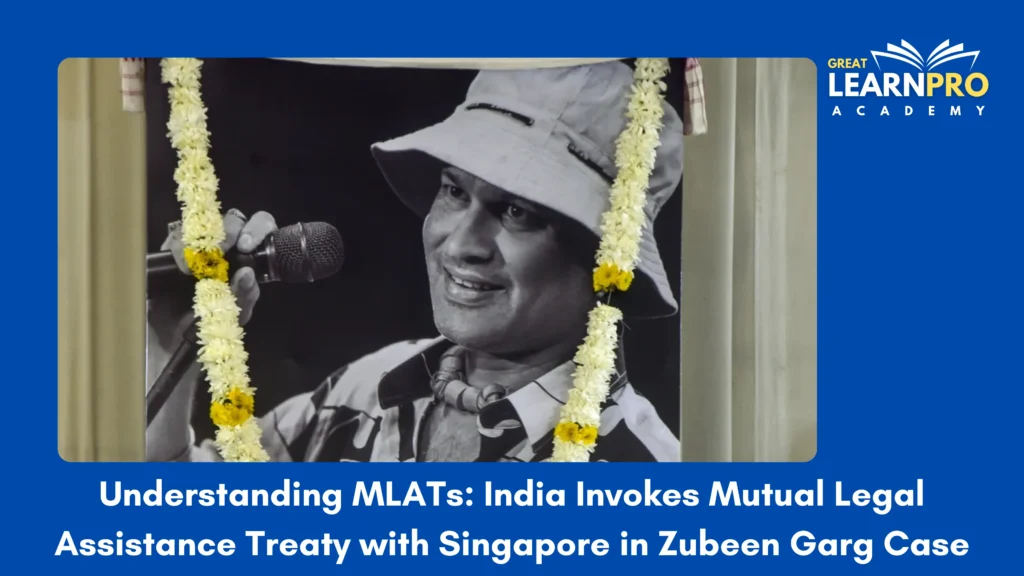In an increasingly interconnected world, crime often transcends national boundaries whether through cybercrime, money laundering, drug trafficking, human trafficking, terrorism, or cross-border financial fraud. In such circumstances, crucial evidence, witnesses, documents, or assets may lie in multiple jurisdictions. This poses a challenge for law enforcement: how can a country effectively investigate and prosecute criminal offences when some of the key materials are located abroad?

A Mutual Legal Assistance Treaty (MLAT) is a formal agreement between two or more states to cooperate in criminal investigations and legal proceedings. Under an MLAT framework, one country (the requesting state) can seek legal assistance from another country (the requested state) in a structured, legally binding manner. Such assistance may include gathering and transmitting evidence, locating or identifying persons, serving judicial documents, taking witness testimony, conducting searches or seizures, and recovering or confiscating proceeds of crime.
The principal advantage of MLATs lies in their direct and legally recognized framework for cooperation, reducing the dependence on informal or diplomatic routes. They ensure that the evidence collected in the requested country meets the procedural and admissibility standards required in court. In India, the Ministry of Home Affairs (MHA) acts as the central authority for receiving, processing, and forwarding MLAT requests in coordination with the Ministry of External Affairs and domestic law enforcement agencies.
However, MLATs are not without challenges. Complex legal procedures often lead to delays in obtaining assistance. Differences in legal systems may cause refusals if the request conflicts with the domestic laws of the requested country. Some treaties have scope limitations, excluding certain offences or evidentiary materials. Moreover, as crimes increasingly involve digital data and cross-border technologies, traditional MLAT processes often struggle to keep pace with the speed required in modern investigations. Despite these hurdles, MLATs remain crucial in promoting international cooperation in criminal justice.
India–Singapore MLAT Invocation in the Zubeen Garg Case
In September 2025, the sudden death of popular singer Zubeen Garg in Singapore drew widespread attention and demands for a thorough investigation. In response, the Assam government urged the central government to invoke India’s MLAT with Singapore to ensure proper legal cooperation and access to all relevant evidence concerning the circumstances of his death.
Following the state’s request, the Ministry of Home Affairs officially invoked the MLAT with Singapore at the end of September 2025. This move allows Indian authorities to seek Singapore’s cooperation in obtaining evidence, case files, medical and autopsy reports, CCTV footage, and witness statements. As the incident occurred in Singapore, most critical materials and testimonies fall under Singaporean jurisdiction, making formal cooperation essential.
A ten-member Special Investigation Team (SIT) was constituted by the Assam government under the supervision of a senior police officer to coordinate with Singaporean authorities. The SIT is expected to work closely with the central agencies to analyze the evidence received and ensure that all procedural formalities are met for use in Indian courts. The MLAT mechanism provides a transparent and legally valid route for such exchanges, preventing procedural challenges that could arise if evidence were collected through informal means.
Once Singapore processes the request, it will return an execution report detailing the nature and extent of assistance rendered. This report will then be routed back through the MHA to the investigating agencies in India. The invocation demonstrates India’s commitment to pursuing justice through structured international cooperation and respecting due legal process.
Significance and Broader Implications
The invocation of the MLAT with Singapore in this case holds several important implications. Firstly, it ensures that the Indian investigation gains lawful access to all relevant records and materials located in Singapore. Secondly, it strengthens the spirit of bilateral cooperation, reinforcing trust between the two nations’ law enforcement agencies. Thirdly, by choosing a formal legal route instead of informal diplomatic exchanges, India ensures that the evidence collected abroad will likely be admissible in domestic courts.
Furthermore, the move sets a precedent for how India may handle similar cross-border investigations in the future. As global mobility increases, incidents involving Indian nationals abroad are likely to rise, requiring stronger mechanisms for cooperation. Invoking the MLAT highlights India’s readiness to activate treaty-based legal channels in sensitive, high-profile cases, ensuring that jurisdictional barriers do not hinder the pursuit of justice.
However, challenges remain. The process may face bureaucratic and legal delays, as Singaporean authorities must follow their domestic laws before executing India’s request. There may also be issues of partial cooperation, especially if some evidence is deemed sensitive or confidential under Singaporean law. Even when evidence is shared, Indian courts must verify its admissibility and ensure that the chain of custody remains intact. Additionally, maintaining diplomatic balance is crucial, as excessive pressure or overreach could strain bilateral relations.
Conclusion
Mutual Legal Assistance Treaties represent one of the most vital instruments for international cooperation in criminal justice. They provide a structured, lawful, and reciprocal mechanism for countries to assist one another in criminal investigations, ensuring that justice is not constrained by national borders.
The recent invocation of the MLAT between India and Singapore in the Zubeen Garg case is a notable example of how such treaties function in practice. It underscores India’s determination to uphold justice through lawful and transparent means while fostering international cooperation. The success of this initiative will depend on how effectively both countries coordinate, exchange information, and respect each other’s legal frameworks.
In an era where crime and evidence often cross borders, MLATs serve as indispensable tools for ensuring accountability and strengthening the rule of law worldwide.
Sources:
- https://m.economictimes.com/news/india/zubeen-garg-death-ministry-of-home-affairs-invokes-mlat-with-singapore/articleshow/124243117.cms?utm_
- https://timesofindia.indiatimes.com/city/guwahati/zubeen-garg-death-centre-invokes-mutual-legal-assistance-treaty-with-singapore-says-assam-cm-sit-formed/articleshow/124231655.cms?utm_
- https://www.mea.gov.in/mutual-legal-assistance-in-criminal-matters.htm?utm_
More Current affairs: https://learnproacademy.in/updates/
